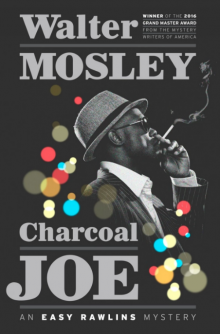Walter Mosley's Blog, page 5
May 1, 2017
The People, The Press & The President
The government is declaring war on the press and the press is fighting to uphold the journalistic freedom necessary for democracy to function. Genuine news media outlets are discredited at every turn while fake news — the real fake news — gains influence. It’s no wonder that public trust in the media is at an unprecedented low.
But it’s not just a battle between Trump and The New York Times. Everyone’s freedom is at stake if the press is silenced and power goes unchecked. Public trust in a free press has actually never been more vital. How do we begin to bridge the divide between the public and the press and together, keep our government accountable?
On April 28, 2017, as a part of the BRIC OPEN Festival, BRIC TV hosted The People, The Press & The President: A #BHeard Town Hall. Our esteemed panel included Kyle Pope, Editor-in-Chief of Columbia Journalism Review, Naomi Wolf, Author, Political Activist, and Co-Founder of Daily Clout, Walter Mosley, Novelist and Social Commentator, Jeff Jarvis, Director of the Tow-Knight Center for Entrepreneurial Journalism, Ali Gharib, Chief Politics Editor at Mic News, and Sheryl Huggins Salomon, Senior Editor-At-Large at The Root.
Watch as these luminaries engage in dialogue around the current climate of journalism and the press, and solutions to rebuilding public trust around it.
This video is from BRIC TV— the first 24/7 television channel created by, for, and about Brooklyn. It is the borough’s source for local news, Brooklyn culture, civic affairs, music, arts, sports, and technology. BRIC TV features programming produced and curated by BRIC, an arts and media nonprofit located in Downtown Brooklyn, NYC.
Walter Mosley: An UNtopia Future For Society
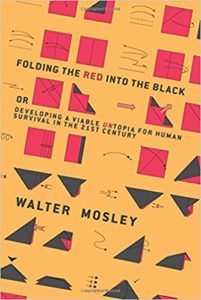 We hosted an interview from last fall with Walter Mosley about his newly published book, Folding the Red Into the Black: Developing a Viable UNtopia for Human Survival in the 21st Century.
We hosted an interview from last fall with Walter Mosley about his newly published book, Folding the Red Into the Black: Developing a Viable UNtopia for Human Survival in the 21st Century.
Mosley is the author of more than 43 critically acclaimed books, including the major bestselling mystery series featuring Easy Rawlins. He is the winner of numerous awards, including an O. Henry Award, a Grammy and PEN America’s Lifetime Achievement Award.
Your browser does not support the audio element.
(via steinershow.org)
April 27, 2017
Author Walter Mosley talks about creating, killing and reviving Easy Rawlins
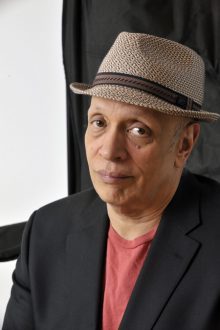 SOUTH BEND — At the end of the novel “Blonde Faith,” Walter Mosley decided that Easy Rawlins, his most famous character, had to die.
SOUTH BEND — At the end of the novel “Blonde Faith,” Walter Mosley decided that Easy Rawlins, his most famous character, had to die.
So after 11 Easy Rawlins novels since “Devil in a Blue Dress” debuted in 1990, Mosley decided to allow Rawlins to have a fatal accident at the end of “Blonde Faith” in 2007.
Mosley told an audience at the St. Joseph County Public Library that he didn’t know where to take Rawlins, the black World War II veteran private eye whom the world first met in “Devil in a Blue Dress.”
“‘Blonde Faith’ was a very romantic novel in a way and I really liked that,” he said. “I enjoyed it, but I felt that I was repeating myself.”
Mosley, the author of more than 50 books of fiction and nonfiction spoke about “Devil in a Blue Dress” at the library as a part of the One Book, One Michiana community reading event that ends on Sunday.
Rawlins had spent years solving murders, finding people and raising children left on his doorstep, all while dealing with the racism of post-World War II Los Angeles. Perhaps it was time for Rawlins to depart. After all, the woman he loved, Bonnie, had decided to marry an African priest.
Rawlins, drunk and behind the wheel of a car on the Pacific Coast Highway, passes three cars before swerving onto the shoulder to avoid a collision with a truck.
“But the shoulder ends and he drives off the side of the road,” Mosley said, adding that was not was the planned ending for “Blonde Faith.” But by the time Mosley was nearing the end of “Blonde Faith,” which is set in 1960s during the Vietnam War, the author said he suspected the time was right.
“But then I thought that maybe I wrote it for a reason because I believe that most art is unconscious, so I’ll just let him be dead and that will be that because I can’t think of another Easy Rawlins book,” Mosley said.
Mosley wrote other books of fiction and nonfiction after “Blonde Faith” was published in 2007, including several that featured a new private eye based in contemporary New York named Leonid McGill.
However, Mosley it turned out wasn’t finished with Easy Rawlins. Mosley resurrected Rawlins in the 2013 novel “Little Green,” as it turned out Rawlins actually survived a coma after the accident.
“It dawned on me as I looked back on ‘Devil in a Blue Dress’ that this is (set) in 1948, four years before I was born,” he said. “This is me trying to talk about and celebrate the world of my father, his family and friends.”
Mosley said that his writing is driven by the belief that if people do not exist in literature they do not exist at all. “Because nobody in America reads history so I wanted to write about my father’s family, and the black people living in Los Angeles, building Los Angeles, oppressed by Los Angeles,” he said.
Mosley said the revived Rawlins remains in Los Angeles, but its the L.A. of the late 1960s that the author knew and grew up experiencing. “I will be writing about the same characters and the same events and people, but the stories will be on equal setting with me because it will be what I know,” Mosley added.
In an interview prior to the lecture, Mosley said the newer books give him a chance to show how Rawlins and Jackson Blue and Mouse, the other main characters readers meet in the series, have evolved. “In 1948 if you were in Santa Monica or Beverly Hills and you were black, you were stopped and most likely arrested,” Mosley said. “By the books I’m writing now it’s 1968, 1969 and you can be anywhere and can do anything.
“You still have trouble, but the trouble has changed and the world has changed and the potential has changed.”
Easy Rawlins was a janitor in “Devil in a Blue Dress.” His friend Jackson Blue was a con man and Mouse was a thief. In the latest book, “Charcoal Joe,” Rawlins is a property owner, Jackson Blue is the No. 2 man at the largest insurance company in the world and Mouse is the member of a crew that pulls heists all over North America, Mosley said.
“In their chosen fields they’ve gotten so much better, and I love that about them.
(via southbendtribune.com)
February 24, 2017
New Walter Mosley novel coming in 2018
 Best-selling novelist Walter Mosley will publish a new novel with Mulholland Books, an imprint of Little, Brown and Company, EW can announce exclusively.
Best-selling novelist Walter Mosley will publish a new novel with Mulholland Books, an imprint of Little, Brown and Company, EW can announce exclusively.
Titled Down the River Unto the Sea, the novel centers on a former New York City police detective, now working as a Brooklyn PI, who is investigating the case of a Black civil rights activist convicted of murdering two city policemen. At the same time, he’s still trying to piece together the conspiracy that caused his own downfall at the hands of the police.
This novel will mark Mosley’s return to Little, Brown, where he’ll be edited and published by Mulholland Books’ Josh Kendall. Down the River Unto the Sea is slated for a Feb. 20, 2018 publication.
(via EW)
February 14, 2017
‘Devil in a Blue Dress’ is this year’s One Book selection
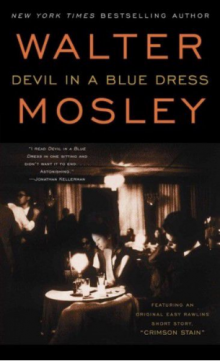 SOUTH BEND — “Devil in a Blue Dress,” a 1990 mystery novel by Walter Mosley, will be the “One Book, One Michiana” selection for 2017.
SOUTH BEND — “Devil in a Blue Dress,” a 1990 mystery novel by Walter Mosley, will be the “One Book, One Michiana” selection for 2017.
The title was announced Monday by the St. Joseph County Public Library.
Community residents will be encouraged to read the book, and participate in a series of related discussions, lectures, film screenings and other events this spring.
“Devil in a Blue Dress” was Mosley’s first published book. The plot focuses on black war veteran Ezekiel “Easy” Rawlins and his transformation from a day laborer into a detective. The story is set in 1948 in the Watts area of Los Angeles.
The novel won a 1991 Shamus Award in the category “Best First P. I. Novel.”
The book was made into a 1995 film of the same name, starring Denzel Washington as Easy Rawlins, and also featured Jennifer Beals, Tom Sizemore, Maury Chaykin and Don Cheadle.”
(via southbendtribune.com)
January 17, 2017
From Marilynne Robinson to Richard Ford, six writers in search of Trump’s America
by Robert McCrum, The Guardian

Ariel Levy, Richard Ford, Marilynne Robinson, Walter Mosley, Malcolm Gladwell, Lionel Shriver. Composite: Getty Images, Karen Robinson, Tim Knox, Murdo Macleod
On the night of 8 November 2016, the United States, a mature republic of 241 summers, experienced a dreadful upset and fell into a condition that hovered between catatonia and hysteria.
On college campuses, young women were throwing up. Others were setting fire to things, or phoning their families in tears. Among distraught middle-class Democrats, there was a dramatic spike in psychotherapeutic appointments. Across New York City, a spontaneous graffito, “Not My President”, summarised the metropolitan mood.
As the tide of history slackened towards Christmas, the national response moved through the stages of grief: denial, anger, bargaining and depression. Come the new year, there has been the beginning of the fifth stage, acceptance. The end is nigh is the consensus, but not that nigh.
Besides, there are remedies. Americans know that, ever since Jefferson drafted the Declaration of Independence, theirs is a society constructed with strokes of the pen, in words. Their constitution is a work in progress, constantly rewritten, and the power of an idea is stronger than a demagogue with no ideology. American writers know this better than anyone.
As the unanticipated transition from Obama to Trump gathered momentum, I set out across the east coast to meet six authors – Marilynne Robinson, Richard Ford, Walter Mosley, Ariel Levy, Malcolm Gladwell, and Lionel Shriver – in search of a new society. Marilynne Robinson, author of Housekeeping and Gilead, is one of Obama’s favourite writers. She understands America’s frontier instincts, and she’s a Christian, which connects her to another part of the American dream. In conversation with her, the rewriting of America seems at once rational and practicable. Her articulate resilience suggests that the republic is probably not yet “broken”. In her company, the challenge of the new administration seems answered by the integrity, candour, and good humour of the American mind at its best. Talk to Robinson, and you can detect the beginnings of an opposition to Trump. She admits she has been galvanised by America’s crisis. “I’m frankly sort of glad that this bizarre thing has happened,” she says. “Trump has brought us to a state where we will have to do a lot of very basic thinking about how our society goes on from this point.”
Robinson has been talking to her associates in the literary community. “People have grown very fond of the first and fifth amendments,” she reports. “My friends say: This is on us. It will be important how we respond, and those who did not vote Republican must become the resistance.”
Robinson believes in her fellow citizens. “Meaningful democracy is based on the integrity of its individuals,” she says, “and there’s still a basic integrity to this society.” In conclusion, Robinson’s faith in her country resounds loud and clear. “People will try all kinds of things, and will recover a sense of possibility. The people are passionate. We have many resources. Our system is not broken.”
Richard Ford lives further north, in snowy Maine, but many of his characters are from red-state America. Frank Bascombe, the protagonist of four novels beginning with The Sportswriter, might not have voted for Trump, but he would know plenty of middle-aged white males who did.
Ford is all-American. He hunts, he shoots, and he’s an instinctive libertarian, passionate about words and ideas, and the freedoms they enshrine. He’s more pessimistic than Robinson, perhaps because he was wrongfooted by November’s vote. “I said Trump was an impossibility. The fact that I was so completely wrong has made me doubt what I understand about my country.”
Ford concedes that “we must blame ourselves. We are the citizens who did this. Our only response is to fall back on our sense of citizenship”. But while there is cause for some optimism in the institutions of government, he is not complacent: “This is a dark moment in American history.”
Walter Mosley, of the same generation, grew up in Los Angeles. His father was black, his mother Jewish, and he came of age in the Watts riots of 1965. An acclaimed crime writer, he sees Trump’s election as “a necessary misstep. We’ve had the blue states on both coasts filled with liberals and progressives who have dismissed the midwest and southern states as ‘stupid hicks’ for so long that these people finally said, ‘I don’t care who I vote for so long as it’s someone who has nothing to do with you guys.’ People in the red states felt ignored, and neglected. I can sympathise with, and respect, that protest.”
Mosley is keeping a beady eye on the transition. “We’ll have to see what Trump is going to do. If it’s bad enough, I won’t be writing novels, I’ll be talking and writing about it.” Mosley is sanguine about Trump’s trashy, undisciplined qualities. “From my perspective,” he told me, “we’ve had a lot of bad presidents.” Having dismissed JFK, Reagan and two Bushes, he’s still inclined to look on the bright side. “There’s so much potential here now,” he says. “Especially now the progressives realise that they will have to do something to have the world that they want, to make America better.”
Ariel Levy, feminist intellectual and author of Female Chauvinist Pigs, echoes this sentiment. She says: “Hillary would have been a great president, but people have had it with elites. Where do I go now? That’s my challenge.” Levy still has a voice. “We can still do what we do, and keep writing. A free press is essential. You’d have to be a weird, inanimate lump not to be affected by Trump. There’s nothing that he does not touch. This is our world now, and it’s going to energise us.”
If there’s one writer in tune with the zeitgeist, it’s Lionel Shriver whose high-school massacre novel, We Need to Talk About Kevin, nailed much of contemporary America. Her dystopian imagination fathoms the darker parts of the US. Shriver, the perfect guide to this new New World, is revelling in the president-elect’s antics. “Entertainment is the main thing I’m getting out of Trump,” she told me. “This may not be a good thing, but I’m going to enjoy it, in a sick way. It’s such a spectacle.” However, like many Americans she will respect him as her president. “We cannot wish Trump ill,” she instructs, “because that would be to wish ourselves ill. I have every hope that we’ll get through these four years, and that our system will survive.”
What might sustain this resilience? “A sense of humour is going to get us through better than indignation,” she declares. “People on the left are so puffed up with self-righteous outrage.” Shriver has turned to Elmer Gantry for consolation, but she’s discreet about connecting the book to the politician who became an obsession for its author, Sinclair Lewis: the southern demagogue Huey Long, who was assassinated in 1935.
In Greenwich Village the writer and journalist Malcolm Gladwell, bestselling author of The Tipping Point and Blink, shares Shriver’s appetite for the potential mayhem of “unrestrained Trumpism”.Gladwell notes, provocatively, that under the rhetorical genius of Obama, “writers lost their tongue. Now we’ve got our voice back, and it’s going to be a wild ride”. He’s become nostalgic for his days as a reporter: “I would do anything to have my old job on the Washington Post. This is the kind of situation you live for as a writer, moments of upheaval and confusion. As a reporter for the next four years, you’re going to have the best time getting Washington to talk to you. You’re going to have fun. It will be open season during the Trump administration.”
As inauguration day draws near, Gladwell makes a persuasive case for the limitations to Trump’s power. “He’s probably too lazy and undisciplined to usurp power. His first mistake has been to marginalise both African-Americans and Hispanics. ‘Whites only’ is not a winning strategy. In the end he will cede vast areas to the Democrats.”
During the week that the CIA and Trump have been at war over Russia, Gladwell also questions the wisdom of alienating the spooks. “One thing you should never do is thumb your nose at the intelligence community. The CIA is not full of hapless boobs but intelligent people who have all the secrets, and will find a way to do you in.”
Gladwell draws an intriguing historical parallel. “The last true American bully we had was Joe McCarthy. For a number of years everyone went along with him, and he had enormous success – in the short run. But people get sick of this kind of rhetorical strategy. America’s patience with Trump’s vulgarity will be limited. Fundamentally decent people will long for a return to dignity. That’s what happened with McCarthy. Eventually someone’s going to stand up and say, ‘Enough!’”
America Rewritten, by Robert McCrum, will be broadcast on Radio 4 at 9.45am from 16-20 January
December 14, 2016
2016 Mystery and Thrillers Not to Miss
Charcoal Joe (Easy Rawlins Mystery #14) by Walter Mosley, Michael Boatman (Narration): Boatman is the perfect narrator for this hard-boiled detective novel, and exactly what I imagined Easy Rawlins to sound like. Set in late 1960s L.A., you get a good mystery–Rawlins is forced on a murder case by a man Rawlins is wise to not say no to–a ladies’ man PI, Mosley’s detailed writing for even minor characters come vividly alive, and an unflinching view of racial tensions. While it’s 14th in the series it also worked as a standalone for me. If you’re looking for more Mosley here’s a reading pathways.
(via bookriot.com)
December 9, 2016
Strand Magazine Issue 50
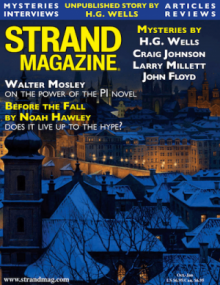 The fall issue of the Strand will include a short story by H.G. Wells that has never been published before, titled “The Haunted Ceiling,” this hidden gem is part supernatural, part psychological and is rich in atmosphere. Our 50th issue will also feature a exclusive interview with the talented and prolific Walter Mosley, where the celebrated author of the Easy Rawlins series spoke about noir legends, the craft of writing, and what inspires him to write, as well as fiction by Craig Johnson, John Floyd, Jeffrey Pearce, and Larry Millet.
The fall issue of the Strand will include a short story by H.G. Wells that has never been published before, titled “The Haunted Ceiling,” this hidden gem is part supernatural, part psychological and is rich in atmosphere. Our 50th issue will also feature a exclusive interview with the talented and prolific Walter Mosley, where the celebrated author of the Easy Rawlins series spoke about noir legends, the craft of writing, and what inspires him to write, as well as fiction by Craig Johnson, John Floyd, Jeffrey Pearce, and Larry Millet.
December 3, 2016
The 10 Best Crime Novels of 2016
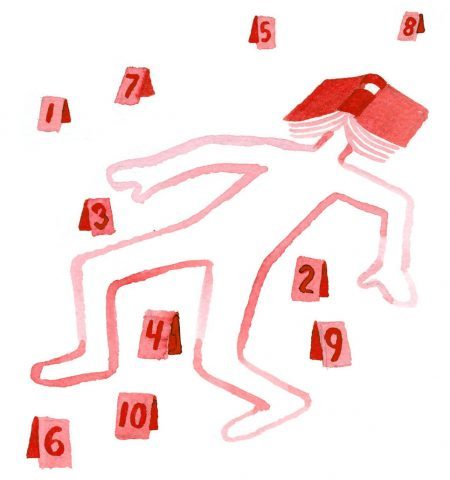
Although it wasn’t done by design, this year’s 10 Best Crime Novels fall neatly into various subgenres. So what you’re really getting are my choices for: Best Rural Mystery Set in Mississippi, Best Mystery Featuring a Drug-Addicted Private Eye, Best Historical Mystery Set in the 14th Century and so on.
CHARCOAL JOE. By Walter Mosley. (Doubleday, $26.95.)Mosley’s mellow private eye, Easy Rawlins, is talking his way through another case in this period mystery set in 1968, when black neighborhoods are still seething with rage after the Watts riots. In this heated climate, Easy is . . . well, easy. No furies in his brain, no fires in his gut, just an unquenchable curiosity about people and their obsessions. Favorite characters like Jackson Blue and Fearless Jones provide backup for Easy, an unconventional hero who’s unafraid to lower his fists and use his brain.
(via The New York Times)
November 22, 2016
Finding a Resilient Spirit at the 2016 National Book Awards
Holding court near the bar, Walter Mosley was practically joyous. He wouldn’t give Trump the satisfaction of having gained power (much less the popular vote). “People in power are the people who are gonna respond to what happened in the election — that’s the power,” he said. “I’m not sure if that’s the people in this room, but I’m sure we’re in that mode. If you have somebody who represents you,” — e.g., Obama — “you’re less likely to stand up for what’s right. But now, you have no choice. So, hey, that’s great. America’s gonna have some fun.”
Read the article on Vulture.com
Walter Mosley's Blog
- Walter Mosley's profile
- 3853 followers


